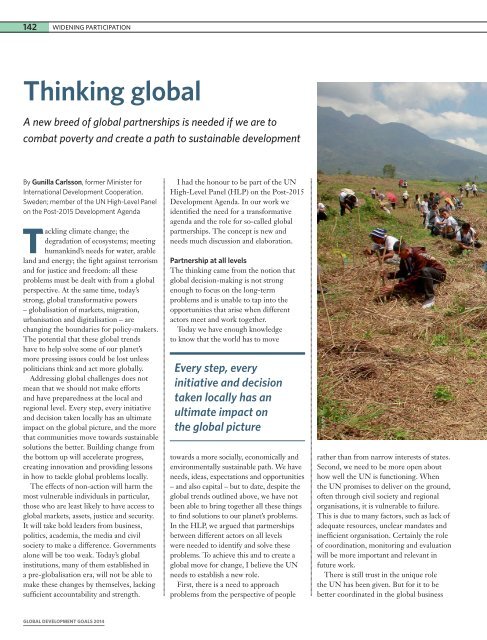FAMBB
FAMBB
FAMBB
Create successful ePaper yourself
Turn your PDF publications into a flip-book with our unique Google optimized e-Paper software.
142 WIDENING PARTICIPATIONThinking globalA new breed of global partnerships is needed if we are tocombat poverty and create a path to sustainable developmentBy Gunilla Carlsson, former Minister forInternational Development Cooperation,Sweden; member of the UN High-Level Panelon the Post-2015 Development AgendaTackling climate change; thedegradation of ecosystems; meetinghumankind’s needs for water, arableland and energy; the fight against terrorismand for justice and freedom: all theseproblems must be dealt with from a globalperspective. At the same time, today’sstrong, global transformative powers– globalisation of markets, migration,urbanisation and digitalisation – arechanging the boundaries for policy-makers.The potential that these global trendshave to help solve some of our planet’smore pressing issues could be lost unlesspoliticians think and act more globally.Addressing global challenges does notmean that we should not make effortsand have preparedness at the local andregional level. Every step, every initiativeand decision taken locally has an ultimateimpact on the global picture, and the morethat communities move towards sustainablesolutions the better. Building change fromthe bottom up will accelerate progress,creating innovation and providing lessonsin how to tackle global problems locally.The effects of non-action will harm themost vulnerable individuals in particular,those who are least likely to have access toglobal markets, assets, justice and security.It will take bold leaders from business,politics, academia, the media and civilsociety to make a difference. Governmentsalone will be too weak. Today’s globalinstitutions, many of them established ina pre-globalisation era, will not be able tomake these changes by themselves, lackingsufficient accountability and strength.I had the honour to be part of the UNHigh-Level Panel (HLP) on the Post-2015Development Agenda. In our work weidentified the need for a transformativeagenda and the role for so-called globalpartnerships. The concept is new andneeds much discussion and elaboration.Partnership at all levelsThe thinking came from the notion thatglobal decision-making is not strongenough to focus on the long-termproblems and is unable to tap into theopportunities that arise when differentactors meet and work together.Today we have enough knowledgeto know that the world has to moveEvery step, everyinitiative and decisiontaken locally has anultimate impact onthe global picturetowards a more socially, economically andenvironmentally sustainable path. We haveneeds, ideas, expectations and opportunities– and also capital – but to date, despite theglobal trends outlined above, we have notbeen able to bring together all these thingsto find solutions to our planet’s problems.In the HLP, we argued that partnershipsbetween different actors on all levelswere needed to identify and solve theseproblems. To achieve this and to create aglobal move for change, I believe the UNneeds to establish a new role.First, there is a need to approachproblems from the perspective of people© Reutersrather than from narrow interests of states.Second, we need to be more open abouthow well the UN is functioning. Whenthe UN promises to deliver on the ground,often through civil society and regionalorganisations, it is vulnerable to failure.This is due to many factors, such as lack ofadequate resources, unclear mandates andinefficient organisation. Certainly the roleof coordination, monitoring and evaluationwill be more important and relevant infuture work.There is still trust in the unique rolethe UN has been given. But for it to bebetter coordinated in the global businessGLOBAL DEVELOPMENT GOALS 2014


